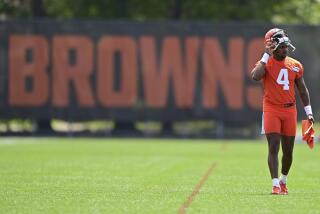Testing for Drugs Is a Three-Stage Process
- Share via
The NFL’s drug and alcohol abuse program is a three-stage process.
All players are required to be tested once a year, which includes testing for steroids, between May 1 and Aug. 20. The SmithKline Beecham Laboratories in Norristown, Pa., conducts all tests on urine specimens for drugs of abuse.
There are additional tests for steroids on a “blind” basis as determined by a computer throughout the season.
Players can only be tested further for reasonable cause, which includes players who have tested positive previously, players who have received treatment for such problems, players who have been arrested for drug- or alcohol-related offenses and players deemed by the team physician to have exhibited behavioral or psychological symptoms of substance abuse.
Stage 1: Players enter the program because of a positive urinalysis for drugs of abuse, medical determination based on behavioral assessment or self-referral.
Players under Stage 1 are evaluated by a psychiatrist and are tested further for 30 days. Failure to cooperate results in a three-game loss of pay, and advancement to Stage 2 of the program.
Stage 2: Players must be tested no fewer than two times or more than 10 a month for two years. A positive test results in a four-game loss of pay or four-week suspension if the player has been fined under Stage 1. A second positive test results in a four-game suspension or six-week suspension if fined under Stage 1, and immediate advancement to Stage 3. Failure to provide a urine sample is considered a positive test.
Stage 3: Players must be tested for three years, and any positive test results in banishment for a minimum of one year. The NFL commissioner determines if and when a player will be reinstated, and if reinstated, that player must be tested for the remainder of his career.
The penalties for testing positive with steroids are more stringent: The first positive test results in suspension of four regular-season games. A second test calls for a six-game suspension and a third is a minimum one-year suspension.
While a suspension is in place, the player may not participate with his team in any way or receive any payment from the club.
Any club or club employee that publicly divulges directly or indirectly information concerning positive drug tests is subject to a fine up to $500,000 by the commissioner.
More to Read
Go beyond the scoreboard
Get the latest on L.A.'s teams in the daily Sports Report newsletter.
You may occasionally receive promotional content from the Los Angeles Times.










